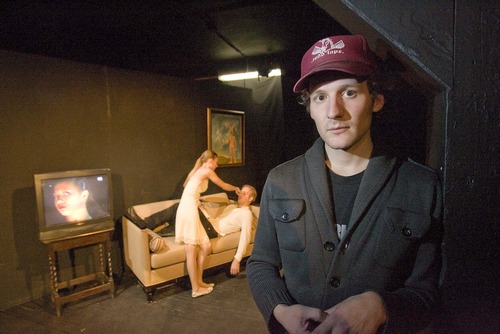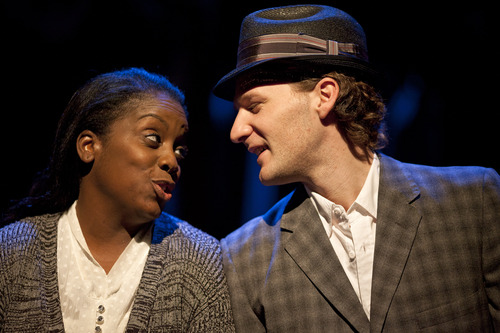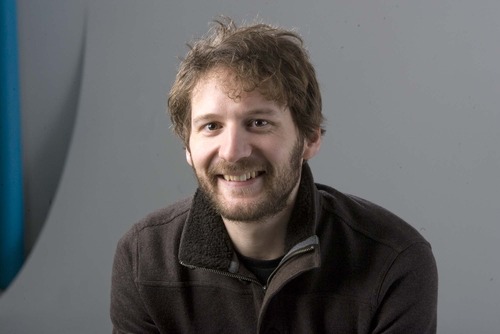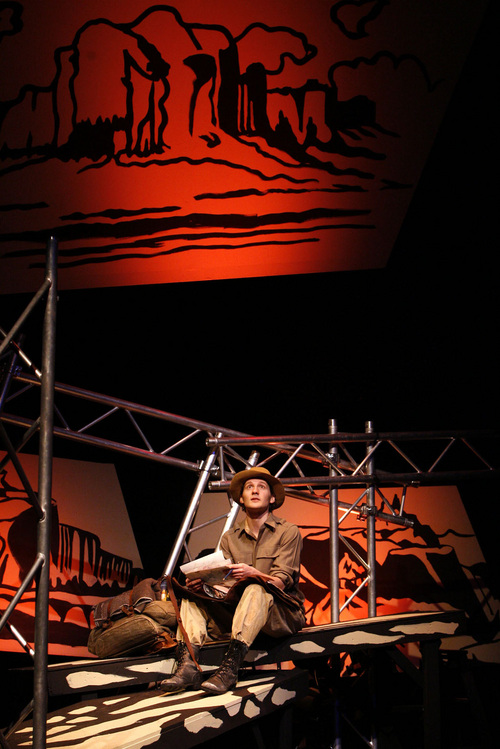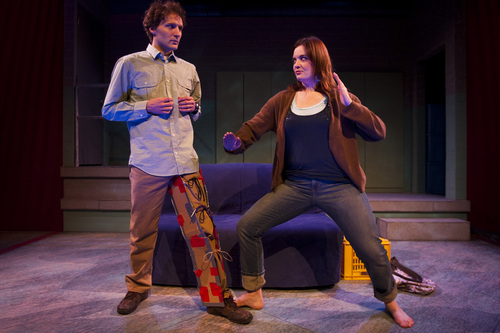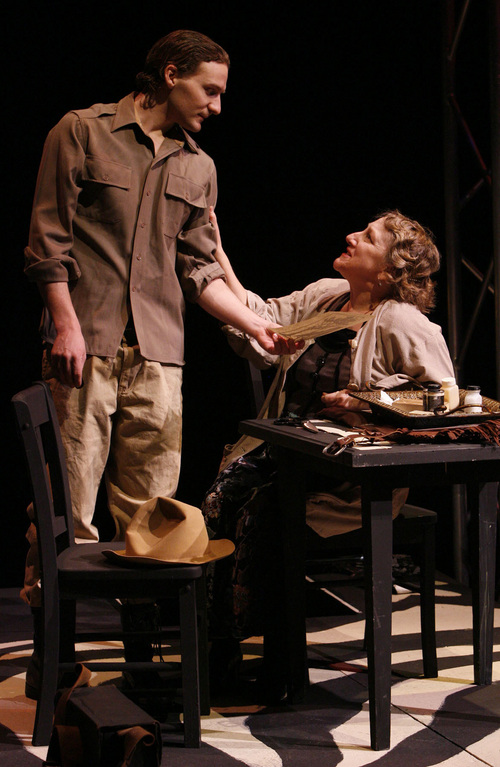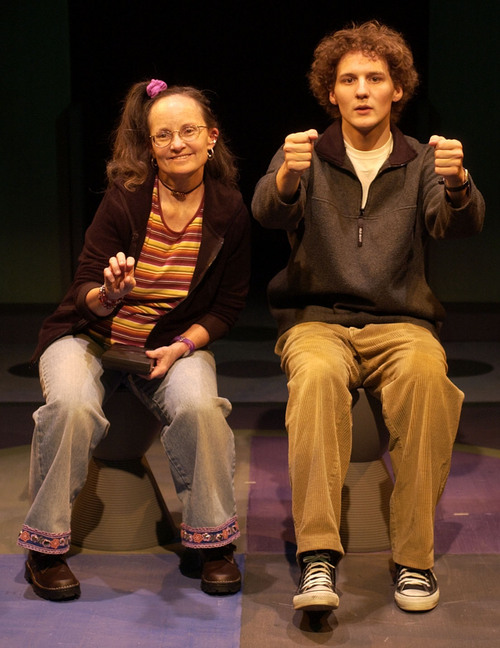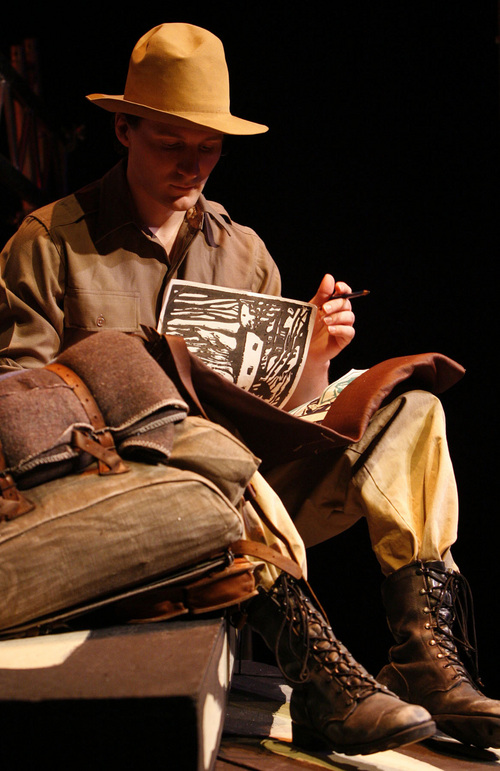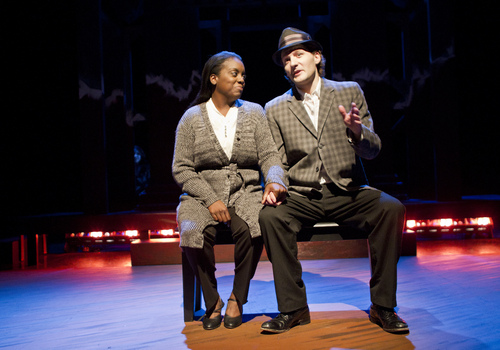This is an archived article that was published on sltrib.com in 2013, and information in the article may be outdated. It is provided only for personal research purposes and may not be reprinted.
To grieve the loss of 30-year-old actor and musician David Fetzer, his family and friends are throwing a party. The event to mark his birthday and the first anniversary of his death has a serious cause: the kickoff of The David Ross Fetzer Foundation — known as The Davey Foundation — a Salt Lake City-based nonprofit to support emerging artists to stage or film new works. It's the brainchild of Betsy Ross, Fetzer's mother, created along with her family and a cast of creative collaborators.
"My mom, through the foundation, is bringing to light David's light, but it will also focus on what he did in life, which is dedicating his time and talent to other people," says Carly Fetzer, David's younger sister and a foundation board member.
—
How he died • Ross found her son dead by a computer at 7 a.m. on Dec. 20, 2012, while he was home visiting for the holidays. It was just three days after his 30th birthday.
According to the autopsy report, "he had the equivalent of two glasses of wine and 0.58 ug/ml of oxycodone (the main ingredient in Percocet) in his system. Just enough," Ross writes in "David Fetzer's Last Act," an essay published in the City Weekly's Dec. 12 issue.
Over the years, her son had become addicted to painkillers, originally prescribed for back pain when he was a teenager, along with Xanax and Adderall for anxiety and focus. "When you think about someone dying unexpectedly, you think of a car accident, an illness," Ross writes. "But, according to Utah's Department of Heath, more Utahns die accidentally from prescription-painkiller overdoses than just about anything else."
In an interview, Ross speaks with a mother's anguish when she talks about her determination to address the state's prescription-drug problem. But her voice is passionate when she talks about launching a foundation to help foster creative work for another generation of Davids.
—
How he lived • Around town, Fetzer was known for his mesmerizing, naturalistic stage performances over the years at Salt Lake City's professional theater companies, starting when he was 13. He created characters you couldn't take your eyes off.
"His quietness — you could hear it," says Cynthia Fleming, executive producer at SLAC. "He had such a gorgeous understated quality to him, and you could feel it in your whole body as an audience member."
Collaborators refer to him as an old soul, spiked with youthful vibrancy. He had an authentic quality that made you feel like the only person in the room. "He would throw his tastes out there, and if you vibed on what he was putting out — music, or theater, or film, or humor — it was sort of unbreakable," says actor Patrick Fugit, a longtime friend and Mushman bandmate.
"We always wanted something to seem very sweet, but to actually be very touching and dark," says Fugit, speaking from Los Angeles, where he is filming "Gone Girl." "It wasn't really worth writing a song unless it was about love, family or death or something like that. We loved any time something was funny because it was tragic. That's when we laughed harder."
Imagine a passionate theater visionary, outside a west Salt Lake City venue on a dark December night, notifying ticketholders to go home after the performance had been shut down by the fire marshal. That's what happened in December 2010 after Fetzer launched the New Works Theatre Machine, aimed at introducing younger audiences to experimental forms.
Fetzer started New Works with a personal loan of $5,500, which his mother co-signed, and things didn't exactly go well. It was difficult to find a venue and an audience. The experience was the kind of funny tragedy that Fugit and Fetzer might have sung about in one of their character-driven folksy guitar songs, or maybe dramatized in a short film.
For many in the theater community, Fetzer's most remarkable role might have been as Everett Ruess in Plan-B's 2008 production of "The End of the Horizon." The character of the boy-poet who disappeared in the wilds of southern Utah in 1934 seemed a perfect match for Fetzer's artistic drive and restlessness. "I was blown away by David's Everett Ruess, so much so I can't imagine anyone else doing the role," says "Horizon" playwright Debora Threedy. "He so perfectly embodied this character who marched to his own drummer."
In an interview before the play's opening, Fetzer, then 25, said he shared Ruess' desire for solitude, "and maybe a tendency to alienate ourselves from our friends because of our passion."
"My future after this play is very much in the air," said the actor, who with friends often couch-surfed between gigs. "That's what I've come to admire about Everett. He really knew what he wanted to do and he did it, unapologetically."
As many of his friends did in interviews for this story, Threedy became emotional in thinking about Fetzer's creative legacy. "He had done so much by the age of 30," says Threedy, a professor at the University of Utah law school, who was one of Fetzer's mother's professors. "I tear up when I think of what he could have done if he had more time."
Theater aside, others are just as passionate about Fetzer's film scripts, or his music, or his "Overman and the Void" cartoons. Ross says the family started realizing the breadth of Fetzer's creative impact in the first hours after his death, thanks to the variety of touching Facebook posts that began pouring in from all over.
"What has surfaced is that David truly had the type of impact that every artist dreams of," says Jerry Rapier, Plan-B Theatre Company producing director. "And the reason he had it and continues to have it is that was never what he was after. He was a genuine person trying to express himself the best way he knew how."
Perhaps Fetzer's real genius was as a creative collaborator. For years on and off, he worked at the Tower Theatre, where in 2006 he helped launch a quarterly Local Open Screen Night, where filmmakers premiered shorts.
"The reason I do everything the way I do artistically is because of David," Fugit says. "I continue to be influenced by David, even still. The jokes I make, the music I make, the acting I do, is all very, very David-inspired, David-influenced, if not directly ripped off from David."
—
About the foundation • At 30, Fetzer was making the transition from performer to producer, from receiving assistance to giving it to others. "His dream, his work, was cut short by his untimely passing," Rapier says. "We're all trying to pick up the pieces of that as we can."
What sets apart the Fetzer foundation is its focus on bootstrapping young artists by teaming with professional companies. Its first three partners — Plan-B Theatre, Salt Lake Acting Company and the Salt Lake Film Society — are all nonprofits where Fetzer worked.
Beyond financial support, recipients will become part of a creative community and receive advice and support from previous winners, says filmmaker Kenny Riches, vice president of the board. Riches directed Fetzer in the 2012 feature "Must Come Down," which was screened at various film festivals last year.
The foundation is supported by family and friends like Riches, who are eager to curate work that Fetzer might have championed.
Its kickoff event, a fundraiser for emerging artist grants, will screen films Fetzer acted in, as well as performances of his songs. In future years, the fundraiser will premiere new works funded by the foundation. Expected to be one of the evening's highlights will be two newly completed shorts that Fetzer wrote.
After his death last year, family and friends found nearly two dozen creative works on his computer. Riches recognized several scripts of film shorts from a time when he and Fetzer were roommates in the Avenues and assigned each other writing homework.
Riches, who now lives in Miami, launched a Kickstarter campaign and raised $18,000 to fund "Isip the Warrior" and "How to Speak Clearly," two shorts that will premiere at the fundraiser.
For Fetzer's creative friends, the kickoff of the foundation offers a chance to keep Fetzer's creative vision alive. "Everything we ever wanted to do, we wanted to do it our way," Fugit says. "When we wrote music, we wanted to do it with our sort of voice to it. The more you get to know the artist that created it — David — the more affecting it is to listen to or watch, because at some level he was always his art, and his art was always him."
facebook.com/ellen.weist —
The Davey Foundation Kickoff
A fundraiser for the nonprofit foundation that will offer grants to support emerging filmmakers and playwrights. The event will feature a memorial to actor, musician and filmmaker David Fetzer, as well as film screenings, musical performances and a silent auction.
When • Tuesday, Dec. 17, 7 p.m.
Where • Tower Theatre, 876 E. 900 South, Salt Lake City
Tickets • $10 minimum donation; thedaveyfoundation.org
Film grant with Salt Lake Film Society
What • Grant of $3,500 toward the completion of a short film to screen at the Tower Theatre.
Calls for submission • Will begin Jan. 15
Application • Visit thedaveyfoundation.org/grants-2/film-grant
Theater grant with Plan-B Theatre Company
What • Playwrights 35 and younger who reside in Utah or have a substantial Utah connection are invited to submit a play script for a production in early 2015 as part of Plan-B's season. Innovative scripts that use multimedia and fit the company's mission and small performance space will receive priority.
Submission • Deadline Jan. 31; award announcement March 15.
Application • thedaveyfoundation.org
Information • Contact Jerry Rapier at jerry@planbtheatre.org or visit planbtheatre.org.
Theatre grant with Salt Lake Acting Company
What • Playwrights 35 and younger are invited to apply for a weeklong mentorship with professional actors and directors before a company reading on Aug. 30, 2015.
Application • A call for scripts will open Sept. 15, with a Dec. 15, 2014, deadline; award announcement March 15, 2015.
Information • Visit thedaveyfoundation.org and saltlakeactingcompany.org


